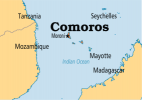The Island of Comoros joins the African Export-Import Bank (Afreximbank), the continental multilateral trade finance institution.
The addition of the Island of Comoros as a participating state moved Afreximbank closer to full coverage of the African continent.
Comoros activated its membership as Afreximbank’s 46th participating state on 12 September when Said Ali Said Chayhane, the Minister of Finance and Budget, signed the instrument of accession to the Agreement Establishing the Bank, committing Comoros to take all necessary steps for the ratification of the Agreement.
Under the terms of the Agreement on the Establishment of the African Export-Import Bank, which was signed by Participating States in Abidjan on 8 May 1993, countries that did not sign on before it entered into force are required to first issue an instrument of acceptance and accession and then proceed to formally ratify the Agreement in order to fully activate their membership of the Bank.
Membership of the Bank gives Comoros automatic access to the full range of products and facilities offered by Afreximbank, including trade finance facilities, project finance services, trade information and advisory services, support in the development of a local content policy and assistance in developing and implementing industrial parks and special economic zones.
In a related development, Chad and South Sudan have completed their Afreximbank membership procedures with their ratification of the Agreement Establishing the Bank.
Mou Ambrose Thiik, Deputy Minister of Finance and Economic Planning of South Sudan, delivered his country’s instrument of ratification to the Bank during a visit to the Bank’s Cairo Headquarters on 19 September.
Chad’s instrument of ratification, which was signed by President Idris Deby Itno on 31 August, will be formally handed over to Afreximbank President Dr. Benedict Oramah during a ceremony in Ndjamena next week.
Current Afreximbank participating states include Angola, Benin, Botswana, Burkina Faso, Burundi, Cameroon, Cape Verde, Chad, Côte d’Ivoire, Democratic Republic of Congo, Djibouti, Egypt, Ethiopia, Gabon, Gambia, Ghana, Guinea, Guinea Bissau, Kenya, and Lesotho. Others are Liberia, Madagascar, Malawi, Mali, Mauritania, Mauritius, Morocco, Mozambique, Namibia, Niger, Nigeria, Republic of Congo, Rwanda, Senegal, Seychelles, Sierra Leone, Sao Tome and Principe, South Sudan, Sudan, Tanzania, Togo, Tunisia, Uganda, Zambia and Zimbabwe.
Participating States become shareholders when they acquire shares in the Bank. Afreximbank shareholders are a mix of public and private entities divided into four classes and consist of African governments, central banks, regional and sub-regional institutions, private investors and financial institutions, as well as non-African financial institutions, export credit agencies and private investors.
Class “A” shareholders are African states, African central banks and African public institutions, including the African Development Bank, while Class “B” is made up of African financial institutions and African private investors.
Class “C” shares are held by non-African investors, mostly international banks and export credit agencies, including Standard Chartered Bank, HSBC, Citibank, China Exim Bank and Exim India. Class “D” shares, a tier approved in December 2012, are fully paid par value shares that can be held by any investor.
Afreximbank is the foremost pan-African multilateral financial institution devoted to financing and promoting intra- and extra-African trade. The Bank was established in October 1993 by African governments, African private and institutional investors, and non-African investors.
Its two basic constitutive documents are the Establishment Agreement, which gives it the status of an international organization, and the Charter, which governs its corporate structure and operations. Since 1994, it has approved more than $51 billion in credit facilities for African businesses, including about $10.3 billion in 2016.

